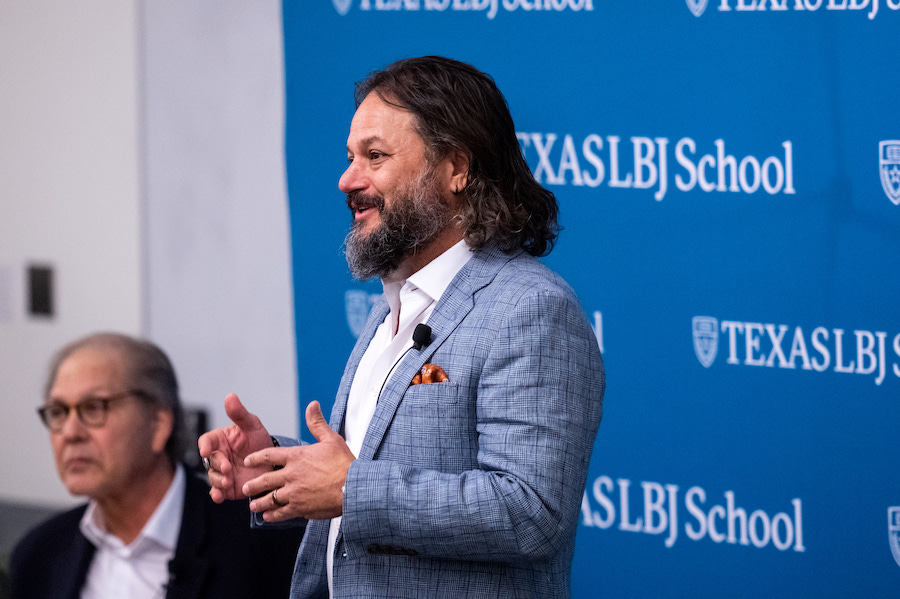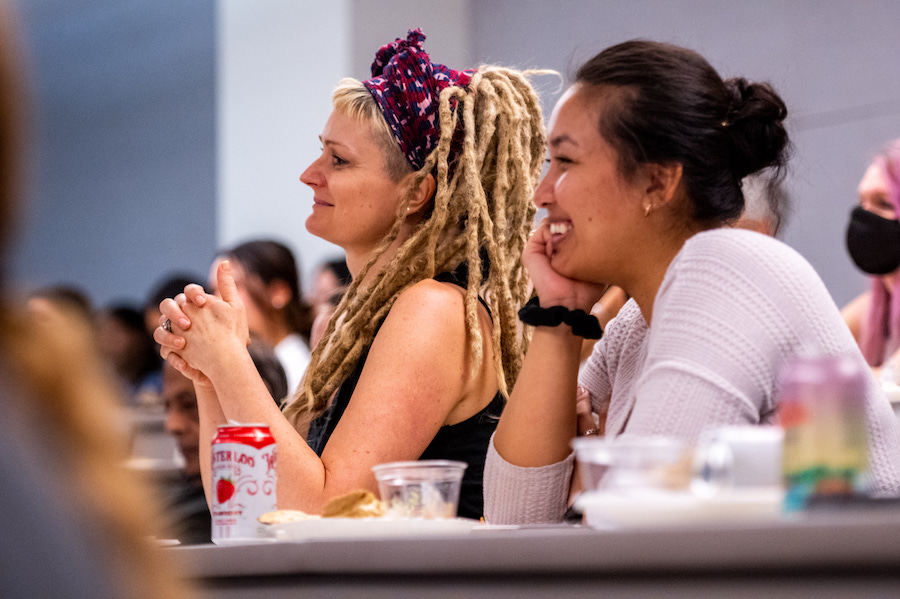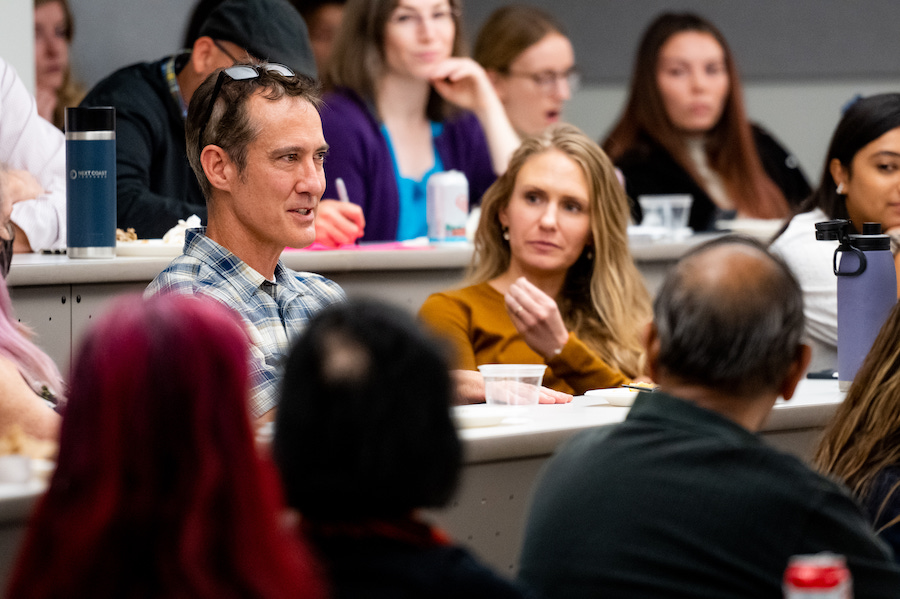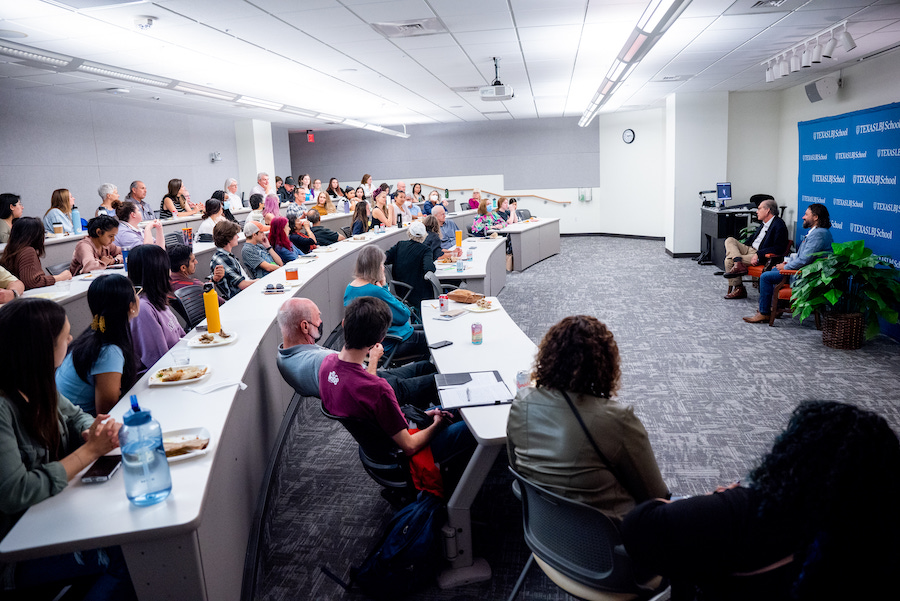
On Wednesday, November 9, UT faculty and staff, community members, and LBJ students and alumni joined for a conversation with psychiatrist and author Howard Cutler, M.D., an expert in the science of human happiness. The conversation was mediated by Center director David Springer, Ph.D, and discussed Dr. Cutler’s research and experience with the scientific study of happiness and its positive affect on relationships, career, health, and the pursuit of community well-being and a civil society.
Dr. Cutler is the co-author of The Art of Happiness, which he wrote with the 14th Dalai Lama. The book, which appeared on the New York Times bestseller list for ninety-seven weeks, includes conversations, stories, and meditations on practices for happiness from a mixture of Western science and Buddhist tradition. He has devoted his career to helping people find happier, more rewarding lives by working with individuals privately as well as by giving presentations throughout the United States and abroad. He has been featured in Time magazine and Psychology Today, among other magazines, newspapers, and radio and television programs. Dr. Cutler holds degrees in art and zoology and earned his medical degree from the University of Arizona College of Medicine in Tucson. He currently lives in Scottsdale, Arizona.

The conversation began with Dr. Springer’s initial question, “what was it like writing books with His Holiness the Dalai Lama?” Dr. Cutler first met the Dalai Lama in 1982 when he received a grant to study traditional Tibetan medicine. Despite the Dalai Lama’s position, Dr. Cutler remarked that he was truly kind and welcoming. Their relationship continued, and Dr. Cutler pitched the idea of writing about happiness within the integrated context of Western science and psychology and the Dalai Lama’s philosophy. That idea turned into a collaboration that has yielded three books.
When Dr. Springer asked how the relationship has changed him, Dr. Cutler began his discussion of compassion and its relationship to happiness, which is an overarching theme in the three The Art of Happiness books. Before working closely with the Dalai Lama, Dr. Cutler said he felt that his forte “was not the heart but rather the mind” and that compassion might be a personality trait he might not have. Now, he sees nothing more important than compassion, something he says is a trainable skill with practical and personal benefits. “Cultivating happiness and compassion is a way to speed up the evolution of the human brain,” Cutler said, highlighting the importance of compassion in human survival and longevity.
The discussion of compassion continued into a definition of the field of positive psychology. Springer and Cutler discussed compassion as a personal strategy for happiness, and positive psychology has studied the effect of compassion on personal happiness and vice versa, which contrasts a Western view of happiness as misguided and based on tangible achievements and life situation. Cutler discusses the Dalai Lama’s view of happiness, which can coexist with life difficulties. This happiness leads to enhanced resiliency, critical reasoning, integrative reasoning, and overall cognitive function.
Next, Dr. Cutler offered his definition of happiness—the combination of a predominance of positive emotion and an underlying sense of satisfaction. Happiness can range from contentment or tranquility to jubilance and can exist even in the presence of negative emotions. This view asserts that happiness leads to success, not the other way around. To achieve this happiness, Dr. Cutler offered a positive psychology approach including goal setting, physical exercise, exposure to nature, etc. as well as his “art of happiness approach,” which includes analytic meditation and mindfulness practices.
The conversation ended with the discussion of happiness in the context of a divided world. Dr. Cutler introduced the importance of “me and we” framing, or the idea that personal happiness is a prerequisite for an overall more civil society. Dr. Cutler concluded with his hope that the human brain will adapt toward interdependence and belonging, saying that “our [community well-being] work doesn’t work if we aren’t also working to change and improve our brains.”
See the full event photo album on Flickr





